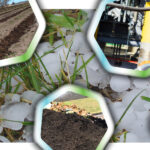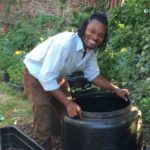
Nora Goldstein
BioCycle August 2018
Next year marks the 60th Anniversary of the launch of Compost Science, now known to the world as BioCycle. As part of our celebration, starting with this August issue (in print and online), we are diving back into the BioCycle/Compost Science archives. We have a lot of awesome material to work with after 60 years!
Let’s begin with a game of BioCycle trivia, which we debuted at the BioCycle WEST COAST18 Champions Dinner. Read the item (most were written by our founder, Jerome Goldstein), and then guess the year it was published.
1. “OPTIMISM HAS ALWAYS been a notable quality of the hardy souls who have long endured the ups-and-downs of the organic recycling industry. Despite a string of economically-thin years that for some businesses continue to exist right up to the present time, there’s a stronger-than-ever belief that we are entering an age of organic recycling where the composters, the land applicators, the community resource recoverers, the on-site waste managers and other hangers-in will at long last receive their just rewards.”
2. “TREND #4: Diversion of food residuals is the next organics recycling frontier (as it has been for the last ten years!). What’s new today is that the generators — recognizing the cost savings — are asking their haulers to switch to diversion to composting instead of disposal. Overall, communities and recycling companies have been gaining success in capturing food for refeeding, composting, anaerobic digestion and other recycling methods — despite the challenges.”
3. “MANY “MAGNIFICIENTLY RIDICULOUS” PROBLEMS: The Editor of Public Works recently opened a carton of corned beef and found that the total bulk of the carton was “easily twice that of the volume of its contents. He called this situation “magnificiently ridiculous” and pointed out that the packaging did nothing whatsoever to improve the flavor of the corned beef. Instead it created another gigantic headache for the people concerned with solid waste removal. “If the bulky packages so common in today’s markets are necessary, then at least they should themselves be edible,” he concludes.”
4. “WASTE UTILIZATION IN SPACE SHIPS: Sustaining life in space travel may be the most challenging problem of all involved in interplanetary flights. As flight durations become longer, the need to recover food, water and oxygen from wastes becomes greater. Recent studies show that using human wastes to grow food and provide drinking water may be one way to solve weight and capacity problems in space ships. At Seattle, Washington, Boeing scientists have developed a “closed ecological system” that handles the waste of persons on normal diets, converts it to reusable forms by treating it with selected bacteria.”
5. “ORIGINAL thinking and bold action are vital to protect our nation from becoming more of a dump than it already is. Again and again, I want to make it clear that we have the technical know-how to treat our wastes without polluting the environment. We are already spending the money in attempts to burn or bury the wastes. So let us use that same money — in many cases less money — to make a potential resource of those wastes.”
Good luck with your guesses — see answers below.









